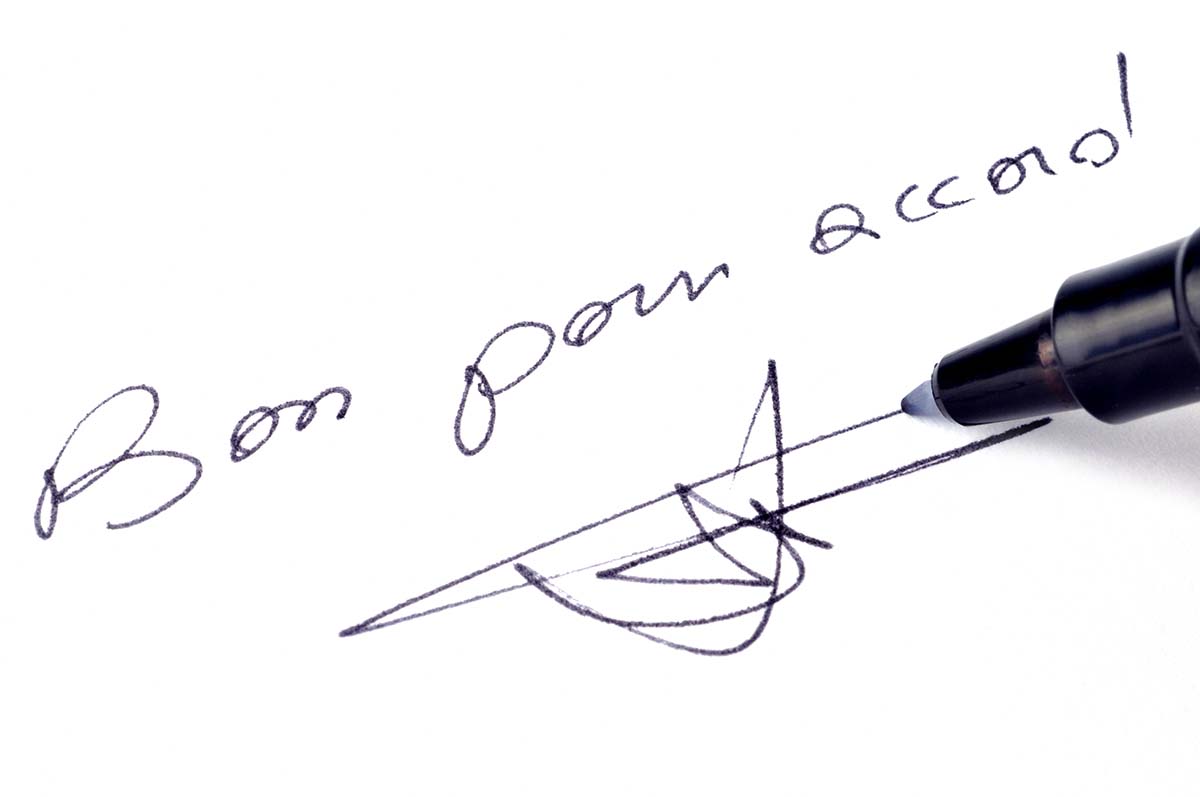The legal value of a handwritten mention is null in 99% of cases

With the digitization of documents, the place given to handwritten mentions is (finally) questioned and this is a good thing. Let us announce it now: they are useless in all documents with two exceptions. This means that their usefulness was already almost zero in the paper world and therefore a fortiori in the digital world. So streamline your procedures, the signature alone is enough for almost all your documents.
When is a handwritten mention required?
For an acknowledgement of debt
In France it is required by law in the case provided for in Article 1376 of the Civil Code which provides, in particular for acknowledgements of debt:
An act under private signature by which only one party undertakes to pay him a sum of money or to deliver to him fungible property is proof only if it includes the signature of the person who subscribes to the undertaking and the mention, written by himself, of the sum or quantity in letters and figures. In case of difference, the deed under private signature is proof for the sum written in full.
For a bond
It is also provided for acts of surety by the Consumer Code in two of its articles, Article L314-15 which provides:
A natural person who undertakes by private deed as guarantor for one of the operations covered by Chapter II or III of this Title shall precede his signature with the following handwritten mention and only with it:
« By vouching for X…, up to the limit of the sum of… covering the payment of principal, interest and, where applicable, penalties or late payment interest and for the duration of…, I undertake to reimburse the lender the sums due on my income and property if X… does not satisfy it itself. «
and article L314-16 which specifies:
Where the creditor applies for joint and several security for one of the transactions covered by Chapter II or III of this Title, the natural person acting as guarantor shall precede his signature with the following handwritten statement:
« By waiving the benefit of discussion defined in Article 2298 of the Civil Code and by binding myself jointly and severally with X …, I undertake to reimburse the creditor without being able to demand that he first sue X … « .
Exceptions to the handwritten acknowledgement requirement
The authentic deed (signed before a notary)
However, even in the cases mentioned above, handwritten or electronic information is useless if the deed is authentic (signed before a notary) as provided for in Article 1369 of the Civil Code :
The authentic act is that which has been received, with the required solemnities, by a public officer having competence and capacity to act.
It may be drawn up on electronic media if it is drawn up and kept under conditions laid down by decree of the Council of State.
When it is received by a notary, it is exempted from any handwritten mention required by law.
The act of suretyship under a residential or mixed lease
In addition to the authentic deed, the requirement of a handwritten mention in the deed of guarantee has a second exception: the commitment of the surety in the context of a residential or mixed lease. Indeed, this obligation was abolished by the ELAN law of 2018, which specifies in its article 134 :
The first sentence of the last paragraph of Article 22-1 of Law No. 89-462 of 6 July 1989 to improve rental relations and amending Law No. 86-1290 of 23 December 1986 is worded as follows: « The natural person who acts as surety signs the deed of guarantee showing the amount of the rent and the conditions of its revision as they appear in the rental contract, an explicit and unequivocal statement expressing its knowledge of the nature and extent of the obligation it is entering into, as well as the reproduction of the penultimate paragraph of this article. »
From now on, the particulars must simply be integrated into the contract and a simple signature is sufficient for their consent.
In these cases, can the word « handwritten » be entered electronically?
Yes, this is provided for in Article 1174 of the Civil Code which states:
Where a writing is required for the validity of a contract, it may be drawn up and kept in electronic form under the conditions set out in Articles 1366 and 1367 and, where an authentic instrument is required, in the second paragraph of Article 1369.
Where a written statement is required by the person who binds himself, the latter may affix it in electronic form if the conditions of such affixing are such as to guarantee that it can only be made by himself.
In short
The handwritten mention is mandatory only for an acknowledgment of debt or a deed of guarantee when these are carried out under private signature and the deed of guarantee is not integrated into a residential or mixed lease. For this to be entered electronically, it is therefore necessary to have recourse to a trusted third party such as Docage to prove that this mention has been entered by the person concerned.
In all other cases the requirement of a handwritten or electronic entry of the words « Good for agreement », « Read and approved », « Received by hand » or other is legally unnecessary.













